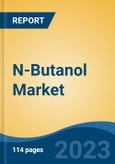Speak directly to the analyst to clarify any post sales queries you may have.
10% Free customizationThis report comes with 10% free customization, enabling you to add data that meets your specific business needs.
Global N-butanol market is anticipated to increase at an impressive rate through 2028. N-Butanol is an alcohol manufactured by processing petrochemical or fermentation of sugars obtained from corn and is also known as 1 butanol or butyl alcohol. It is a primary alcohol having a colorless liquid of standard volatility and fruit-like odor. Due to its characteristic, n-Butanol is used as a raw material for paint and coating resins; butyl carboxylates such as butyl acrylate, butyl acetate, and glycol ethers.
Growing demand for N-butanol from various end-user industries such as paints & coatings, chemical and petrochemical, textile, agriculture, building & construction, pharmaceutical, and personal care for their application is expected to drive the growth of global N-butanol market. Apart from these, the growing use of N-butanol as raw materials in different products like fuels, green buildings, and others further increases the demand for N-butanol, thereby driving the market growth. According to reports, butyl alcohol was the world's 2563rd most traded product worldwide in 2020, which holds 0.003% of world trade. Furthermore, government policies over trade, such as free trade agreements, bilateral agreements, and regional group trade agreements, promote the import and export of raw materials that propel market growth. Thus, it is expected that the global n-Butanol market is going to rise in the projected year.
Rising Demand from Pharmaceutical Sector is Driving the Market Growth
Growing demand for the applications of butyl alcohol, such as butyl acrylate and glycol ethers, is expected to propel the demand for n-Butanol. Butyl acrylates are widely used in pharmaceutical grade for artificial eyes, dentures, and surgical prostheses. Owing to its characteristics, it is commonly used in manufacturing pharmaceuticals, in microscopy for preparing paraffin embedding materials, and in veterinary medicine as a bactericide. According to studies, 15 % of total deaths in lower-middle-income countries happen because of inadequate quality treatment and medical care. Hence, to improve the healthcare situation, the demand for different medical and surgical products is going to upsurge as government efforts increase to improve the situation. Therefore, it is expected that the demand for n-Butanol is going to rise in the forecast period of 2028.
Growing Demand for Industrial Applications is Going to Propel the Market Growth
N-Butanol is primarily used as an industrial intermediary that is used to make different products like dyes, lacquers, resins, and varnishes. The broad melting and boiling points of N-butanol make it useful for the production of chemicals that are required to cool down entire machinery. Butyl alcohol is used to make rubber cement, safety glass, rayon, photographic film, motion picture, water resistance cloth, artificial leather, and raincoats. Moreover, it has wide application in agriculture for the production of herbicides and other essential agrochemicals. According to the report, the world trade of n-Butanol was amounted to around USD 550 million by value in 2020. In food industries, n-Butanol is used as a dehydrating agent in perfumes and fruit essences and as a flavoring agent in foods and beverages. Hence, owing to its broad application in every end-user industry, it is expected that demand for n-Butanol is going to increase in the projected period.
Increasing Demand for Eco-Friendly Butanol to Drive the Market Growth
Growing demand for green fuel worldwide in order to achieve sustainability goals and ensure optimum and reasonable use of the resources. Owing to n-butanol characteristics, it is a more environmentally friendly, cleaner-burning alternative that can be employed in diesel engines without alteration. Moreover, it can help by reducing greenhouse gas emissions by 86%. Therefore, n-Butanol helps in reducing pollution and helps people to achieve sustainable development. It is expected that there will be a lucrative market for n-Butanol in the future as a fuel.
Recent Development
In September 2020, researchers discovered an implementation of a novel process for n-butanol production through 2-oxoglutarate. Through this research, they explain that enumeration algorithms can become extensive in the spectrum of butanol manufacturing ways.
Market Segmentation
Global N-Butanol market is based on grade and application. Based on grade, the market is divided into industrial grade v/s pharmaceutical grade. Based on application, the market is divided into butyl acetate, butyl acrylate, glycol ethers, direct solvent, plasticizers, and others.
Market Players
Mitsubishi Chemical Corporation, Dow Chemical Company, BASF SE, OXEA GmbH, Sasol Ltd, KH Neochem Co Ltd, China National Petroleum Corporation (CNPC), INEOS Oxide Ltd, Perstorp Holding AB, and Saudi Kayan Petrochemical Company are the key players operating in the global N-butanol market.
Report Scope:
In this report, global N-butanol market has been segmented into following categories, in addition to the industry trends which have also been detailed below:
Global N-Butanol Market, By Grade:
- Industrial Grade
- Pharmaceutical Grade
Global N-Butanol Market, By Application:
- Butyl Acetate
- Butyl Acrylate
- Glycol Ethers
- Direct Solvent
- Plasticizers
- Others
Global N-Butanol Market, By region:
- North America
- United States
- Mexico
- Canada
- Asia-Pacific
- China
- India
- South Korea
- Japan
- Australia
- Europe
- France
- Germany
- United Kingdom
- Italy
- Spain
- South America
- Brazil
- Argentina
- Colombia
- Middle East & Africa
- South Africa
- Saudi Arabia
- UAE
Competitive Landscape
Company Profiles: Detailed analysis of the major companies present in global N-butanol market.
Available Customizations:
With the given market data, the publisher offers customizations according to a company’s specific needs.
This product will be delivered within 1-3 business days.
Table of Contents
Companies Mentioned
- Mitsubishi Chemical Corporation
- Dow Chemical Company
- BASF SE
- OXEA GmbH
- Sasol Ltd
- KH Neochem Co Ltd
- China National Petroleum Corporation (CNPC)
- INEOS Oxide Ltd
- Perstorp Holding AB
- Saudi Kayan Petrochemical Company








